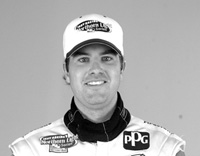| |
 |
| |
Bradley
"Buzz" Calkins has accelerated his Kellogg
School training in the world of professional auto racing.
|
| |
|
Life in
the fast lane
Behind
the wheel with “Buzz” Calkins ’00
Buzz Calkins
’00 lives life in the fast lane. Literally. A professional
race car driver, Calkins, 30, has competed in races all over
the world — including six Indianapolis 500s — earning
more than $3 million in prize money.
Calkins’
racing career started “completely by mistake” at
age 14, when his father bought him a go-kart. He was good,
so he stuck with it.
He continued
to compete as a student at the University of Colorado, winning
the Formula Ford Midwest Division champion in 1990. In 1993,
he began competing internationally. In 1996, he had his best
year, winning the Indy Racing Northern Light Series championship,
earning his team, Bradley Motorsports, $345,533 in prize money.
Despite
what was shaping up to be a promising career in racing, Calkins
knew he had to plan for the future.
“There’s
not a lot of security in [professional] sports — racing
in particular,” Calkins says, citing the win-some-lose-some
nature of competition and the ever-present danger faced by
professional drivers. “Basically I wanted something to
fall back on.”
In 1997
a racing accident landed him in the hospital with a skull
fracture and a broken ankle. Calkins says the experience was
a wake-up call. “Lying there in the hospital for a few
days was the first time I realized that this wasn’t going
to last forever.”
In 1998,
Calkins enrolled at Kellogg full time, juggling classes and
course work with his training and racing schedule.
“I
was definitely busy. I took a lot of red-eye flights, and
did a lot of studying on airplanes, which actually worked
pretty well. Once I figured out how to make it work, it was
actually not bad.”
In Evanston,
Calkins focused on management strategy with the objective
of preparing himself to eventually transition into a career
on the business side of the sport, a move he officially announced
in February when he said he would likely begin working to
grow the Indy Racing League from behind a desk rather than
a steering wheel.
He’s
already won a lot of people over, as has racing. Over the
last 10 years, the sport has gained a huge fan base, due in
large part, he says, to the advent of in-cockpit cameras that
put viewers in the driver’s seat. As a result, the industry
surrounding the sport has grown as entrepreneurs try to find
a way to monetize that interest. Consequently, “there’s
a lot of opportunity within the industry, whether it’s
in ownership or manufacturing the cars or parts for them,
or building the racetrack.”
When he’s
not behind the wheel, Calkins is an avid athlete, having run
in three marathons — twice in Chicago and once in New
York. He also sits on the board of Natural Ties, a national
charity that matches handicapped and non-handicapped individuals
to promote friendship and acceptance.
Calkins
characterizes his team’s recent performance as “mediocre”;
at press time, he was ranked 10th out of 30 drivers. Luckily
2002 is shaping up to be a banner year for Calkins: In recognition
of his academic achievement, sportsmanship and community involvement,
Calkins was selected in October to carry the Olympic torch
part of the way across Colorado on its way to the 2002 Olympics
in Salt Lake City.
“I
am still a little stunned by the whole thing,” Calkins
said. “This is one of the greatest honors of my life.”
—
Chad Schlegel
|



